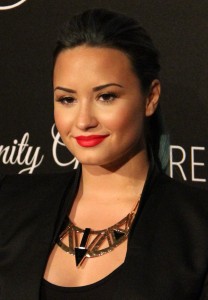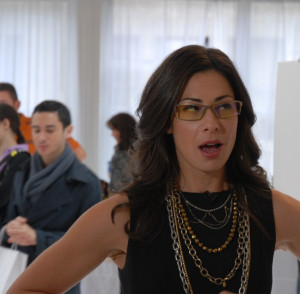- Calls to this hotline are currently being directed to Within Health, Fay or Eating Disorder Solutions
- Representatives are standing by 24/7 to help answer your questions
- All calls are confidential and HIPAA compliant
- There is no obligation or cost to call
- Eating Disorder Hope does not receive any commissions or fees dependent upon which provider you select
- Additional treatment providers are located on our directory or samhsa.gov
Finding Recovery in the Limelight
Contributor: This article was written in collaboration by the Castlewood Treatment Center. Castlewood is a residential eating disorder treatment center that has facilities in St. Louis, Missouri, Monterey, California and Birmingham, Alabama.
 There are many factors that influence the development and persistence of eating and body image disorders, but none so universally as the media. Contemporary media can reach almost anyone, anywhere, with messages illustrated through images, graphics or design.
There are many factors that influence the development and persistence of eating and body image disorders, but none so universally as the media. Contemporary media can reach almost anyone, anywhere, with messages illustrated through images, graphics or design.
Is it any wonder that celebrities and public figures display alarming rates of mental health conditions like depression, anxiety and eating disorders?
Scrutiny Is Constant
Being in the public eye today is tantamount to scrutiny. Celebrity figures are hounded by media, their private lives investigated for show, and their every flaw or mistake amplified for public entertainment. In addition to this, the standard of being thin and ageless is imposed from sources at every corner.
However these standards play out in the public or private sphere, there are a great number of famous individuals who have surmounted struggles with eating disorders, and depression or anxiety, who speak publically about finding a solution.
Their stories offer hope to anyone who has struggled with these issues, demonstrating that it is possible to recover – even when living with the media circus.
Demi Lovato
 One of the most recent, strong supporters of overcoming an eating disorder in the age of global media is Demi Lovato. Singer, songwriter Lovato attended treatment for eating disorders and cutting back in 2010, and has since become one of the most outspoken celebrity advocates for changing the way we think and talk about bodies in today’s culture.
One of the most recent, strong supporters of overcoming an eating disorder in the age of global media is Demi Lovato. Singer, songwriter Lovato attended treatment for eating disorders and cutting back in 2010, and has since become one of the most outspoken celebrity advocates for changing the way we think and talk about bodies in today’s culture.
She has partnered with the Jed Foundation for the Love Is Louder Than the Pressure To Be Perfect Campaign, encouraging young people to love who they are and embrace the traits which make them unique.
Getting the Help She Needed
Lovato told Seventeen Magazine: “My eating disorder will continue to affect me for the rest of my life, but I’m proud to say that I got the help I needed, and am now the happiest and healthiest I have ever been!”
Lovato’s most notable contemporaries include Ashlee Simpson, who publicly admitted that she battled an eating disorder in her pre-teen years, and Mary-Kate Olsen, who attended treatment at an undisclosed facility just before her 18th birthday.
Fiona Apple
Many will also recall how Fiona Apple confronted the same scrutiny as Mary-Kate did, for her too-thin frame.
“I was really depressed and self-loathing.” Fiona states, “For me, it wasn’t about being thin, it was about getting rid of the bait attached to my body.”
The singer and songwriter has spoken about developing anorexia after being raped outside of her mother’s home at the age of twelve. Apple’s struggles with an eating disorder and self-harm, are a combination shared by Russell Brand, who describes being tormented and having struggled with bulimia at the age of 14.
Russell Brand
 While women tend to constitute the majority of cases of eating disorders, and Russell Brand could be considered an interestingly exceptional character, it’s not really as uncommon as most people would believe for men to develop an eating disorder.
While women tend to constitute the majority of cases of eating disorders, and Russell Brand could be considered an interestingly exceptional character, it’s not really as uncommon as most people would believe for men to develop an eating disorder.
The rate of eating disorders among college men ranges from 4-10% (relatively similar to that of women), and larger scale surveys have concluded that male body image concerns have dramatically increased over the past three decades; from 15% to now 43% of men being dissatisfied with their bodies, rates that are comparable to those of women.
Daniel John
Singer Daniel Johns has spoken about his anorexia and depression, which almost killed him before he received treatment in the late 1990’s. After more than 12 months of rehabilitation treatment, Johns made a full recovery.
Today he enjoys his life with wife Natalie Imbruglia, fellow singer/songwriter.
Caleb Followill
The Kings of Leon front-man, Caleb Followill disclosed he struggled with anorexia, constantly exercising, as a teenager.
Ashley Hamilton
On the subject of leading men, Iron Man 3 star Ashley Hamilton sought treatment for restricting and overeating within the last year. Hamilton has said disordered eating is one of the subjects men never want to talk about.
Elton John
 Elton John has gone public about his struggles with bulimia, and saying that one of the biggest problems he faced was his ego. He couldn’t tolerate being told what to do which served as an obstacle to his progress initially.
Elton John has gone public about his struggles with bulimia, and saying that one of the biggest problems he faced was his ego. He couldn’t tolerate being told what to do which served as an obstacle to his progress initially.
At the time he received treatment he was able to call on friend Princess Diana, who was the first of the Royals to speak of depression and eating disorders.
Princess Diana
Diana’s struggle with bulimia, depression and self-harm made her a source of criticism, stigmatizing her conditions in the media of the time. However her honesty about her mental illness was portrayed by the media, her recovery and spirit of service are what she is most known for.
Through her philanthropy and advocacy, her dedication to helping others is the legacy she leaves behind.
Stacy London
 In the States, reigning royalty remain television and film stars, and few have been so steadfast in their desire to help others with body image issues as Stacy London. The What Not To Wear star has written a book, “The Truth About Style,” about her career and struggle with anorexia and compulsive eating.
In the States, reigning royalty remain television and film stars, and few have been so steadfast in their desire to help others with body image issues as Stacy London. The What Not To Wear star has written a book, “The Truth About Style,” about her career and struggle with anorexia and compulsive eating.
Her role as style expert has placed her in a unique position to offer women advice about how to love the body they have, and dress with pride and dignity at every size and shape.
“My value doesn’t simply come from [being thin],” London has said. “It comes from me and solely from me. It took me a long time to recognize that.”
Empowering Women to Love Their Body
London empowers women to love the body they have, and the success of her long running show demonstrates how hungry we are, as a public audience, for positive examples of healthy body image.
That she suffered with an eating disorder doesn’t define her or the nature of her work, but her message is irrevocably changed for the better as a result of her insight about body image.
The media will likely always hound public figures and exploit successes and shortcomings, but the few who live in recovery and work to share a message of hope are an inspiration to everyone. You can lead a healthy, happy life, and love the body you have!
Community Discussion – Share your thoughts here!
What are your thoughts on the medias portrayal of celebrities in eating disorder recovery? Were you aware of their struggle?
The opinions and views of our guest contributors are shared to provide a broad perspective of eating disorders. These are not necessarily the views of Eating Disorder Hope, but an effort to offer discussion of various issues by different concerned individuals.
Last Updated & Reviewed By: Jacquelyn Ekern, MS, LPC on November 4, 2015
Published on EatingDisorderHope.com

